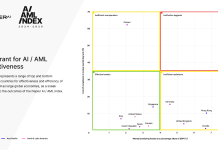In the rapidly evolving financial services industry, the importance of effective risk assessment is often overlooked.
With the industry’s focus on rapid growth and market domination, the critical role of risk assessment in preventing money laundering, terrorist financing, and other illegal activities is frequently sidelined. This negligence can lead to severe consequences, including regulatory fines and reputational damage, ultimately impeding a company’s ability to compete.
RegTech company Arctic Intelligence recently explored what makes risk assessments the bedrock of financial services compliance.
It pointed to a quote from Jay Postma, President of MSB Compliance, which highlights the importance of a solid foundation for compliance programs. He asserts, “No matter how strong, effective, or well-tailored an AML/CFT and sanctions compliance program appears to be, it will not stand the test of time if built upon sand.” Risk assessment is this cornerstone, ensuring the resilience and robustness of compliance strategies. However, this critical function is often treated as a minimal requirement, leading to dire outcomes for all stakeholders involved.
A robust Anti-Money Laundering (AML) and Countering the Financing of Terrorism (CFT) compliance program hinges on effective risk assessment. This process enables financial institutions to identify and prioritize potential vulnerabilities, develop targeted controls, enhance decision-making, avoid regulatory repercussions, and gain a competitive edge. A well-implemented risk assessment process fosters trust among customers, regulators, and investors, crucial for attracting new business and ensuring long-term sustainability.
Despite its undeniable benefits, risk assessment often takes a backseat in many financial institutions. This neglect can be attributed to factors like a lack of awareness among management, resource constraints, and a prioritization of short-term gains over long-term risk management.
Overlooking risk assessment can lead to severe consequences, such as increased vulnerability to money laundering and terrorist financing, regulatory violations, operational inefficiency, and loss of customer trust. This neglect can damage an institution’s reputation and market position.
For long-term success, it’s vital for financial institutions to prioritize effective, ongoing risk assessment. This includes gaining support from the board and senior management, adopting a risk-based approach, allocating sufficient resources, conducting regular reviews and updates, and fostering a compliance-centric culture.
Embracing effective ongoing risk assessment offers numerous benefits, including enhanced security, improved regulatory compliance, increased operational efficiency, a stronger reputation, and improved financial performance.
The Financial Crimes Enforcement Network (FinCEN) emphasizes the importance of a compliance-focused culture within financial institutions. The Anti-Money Laundering Act of 2020 further underscores the necessity of meaningful risk assessments, aligning with National AML Priorities.
Risk assessment is a strategic imperative for financial institutions. It is the foundation of a robust compliance program and a key driver of long-term success. By investing in effective risk assessment, financial institutions can safeguard their future in an ever-evolving landscape.
Arctic Intelligence and MSB Compliance Inc. are collaborating to offer innovative solutions for efficient risk assessments in the U.S. MSB and FinTech market. This partnership is dedicated to helping financial institutions establish a strong, compliance-driven foundation.
Read the full story here.
Keep up with all the latest FinTech news here.
Copyright © 2023 FinTech Global











